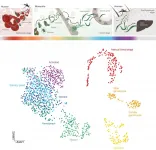Socioeconomically disadvantaged adolescents' diets worsened during lockdown
The authors stress the need for public policies to prevent a continued increase in nutritional and health-related inequalities
2021-05-27
(Press-News.org) Eating habits amongst the young changed during the lockdown imposed due to COVID-19 and worsened in the case of those belonging to socioeconomically disadvantaged groups. These are the chief findings of an open access study published in specialist journal Nutrients, headed by researchers Alícia Aguilar Martínez, of the Universitat Oberta de Catalunya, and Marina Bosque Prous, of the UOC and UManresa, as part of the DESKcohort project of the interuniversity Epidemiology and Public Health research group GRESP.
The study, of 303 Catalan young people aged between 12 and 18, sought to establish how this age group's diet had changed from March to May 2020, in terms of both eating behaviours and the products consumed. The goal was to collect data to ascertain whether the changes were different depending upon the quality of their diet prior to the pandemic and their socioeconomic position.
For Aguilar Martínez, expert in adolescent nutritional health, "understanding how lockdown affected the quality of the diet of young people helps us determine which factors impact adolescents' food-related decisions and behaviours".
Differences due to socioeconomic position
The study shows how young people in more socioeconomically disadvantaged positions cut back on their consumption of cereals and vegetables and increased their intake of convenience foods. The figures show that the risk of a worsening in the diet of this group is 21% greater for adolescents from other socioeconomic realities. Bosque Prous notes how the figures point to "an increase in inequalities amongst a group already vulnerable before lockdown".
Given the findings, continues this expert in public health, "the public administrations would do well to foster actions and policies that help prevent situations such as these or be better prepared for any future lockdowns". The data gathered in this study, said the researchers, "can be useful in the design of public health actions, programmes and policies aimed at this group".
With regard to the general changes noted, the study finds that 40% of young people have increased their consumption of fruit and 21.5% say that they have eaten a more varied diet. 39.3% have cut their consumption of sweets and pastries, 49.2% that of convenience foods and 49.8% that of sugary soft drinks. On the other hand, 56% acknowledge having snacked between meals and having eaten those meals on a more irregular basis. Nevertheless, the researchers stress that "there is a need to analyse whether these changes, which have arisen over a short period of time, will remain in place in the long term."
Aguilar issues a warning, noting that adolescence is a critical period in the establishment and consolidation of lifestyles that affect both development and the prevention of diseases in adulthood. This is why, she said, there is a need to "focus on the characteristics of more vulnerable groups when it comes to developing public policies and making recommendations on a healthy diet. They must be adapted to those at most risk and prevent any continued increase in nutritional and health inequalities", she advocated.
INFORMATION:
The DESKcohort project is an initiative headed by the University of Vic - Central University of Catalonia and by the UVIC-UCC/UOC Epidemiology and Public Health interuniversity research group, with the support of the Subdirectorate-General for Drug Addiction of the Catalan Public Health Agency and of the Catalan Ministry of Education.
This study helps in achieving Sustainable Development Goal 3, Good Health and Well-Being, and 10, Reduced Inequalities.
Reference paper:
Alicia Aguilar-Martínez, Marina Bosque-Prous, Helena González-Casals, Ester Colillas-Malet, Susanna Puigcorbé, Laura Esquius and Albert Espelt. Social Inequalities in Changes in Diet in Adolescents during Confinement Due to COVID-19 in Spain: The DESKcohort Project. Nutrients 13(5), 1577 (2021) doi: https://doi.org/10.3390/nu13051577
UOC R&I
The UOC's research and innovation (R&I) is helping overcome pressing challenges faced by global societies in the 21st century, by studying interactions between technology and human & social sciences with a specific focus on the network society, e-learning and e-health. Over 500 researchers and 51 research groups work among the University's seven faculties and two research centres: the Internet Interdisciplinary Institute (IN3) and the eHealth Center (eHC).
The United Nations' 2030 Agenda for Sustainable Development and open knowledge serve as strategic pillars for the UOC's teaching, research and innovation. More information: research.uoc.edu. #UOC25years
ELSE PRESS RELEASES FROM THIS DATE:
2021-05-27
For years, food producers who make lightly preserved, ready-to-eat food have had to follow a set of guidelines to stop growth of Clostridium botulinum bacteria and production of a strong neurotoxin. The toxin can cause a serious illness called botulism.
For refrigerated products, the guidelines for controlling Clostridium botulinum indicate that the water contained in the products should have a salt content of at least 3.5%. Unfortunately, this hampers efforts to develop salt-reduced products, even though such products would benefit public health, as most consumers eat more salt than recommended.
If food producers want to launch products that contain e.g. less salt, they have had to conduct laboratory experiments to document ...
2021-05-27
Current neural network algorithms produce impressive results that help solve an incredible number of problems. However, the electronic devices used to run these algorithms still require too much processing power. These artificial intelligence (AI) systems simply cannot compete with an actual brain when it comes to processing sensory information or interactions with the environment in real time.
Neuromorphic chip detects high-frequency oscillations
Neuromorphic engineering is a promising new approach that bridges the gap between artificial and natural intelligence. An interdisciplinary research team at the University of Zurich, the ETH Zurich, and the ...
2021-05-27
What keeps consumers hooked on high sugar soft drink? Advertising, of course. But why are some consumers more adept at ignoring these cues than others?
A new study from Flinders University, published in Appetite, found participants with an automatic bias towards soft drinks - or difficulty resisting sweet drinks compared to non-sweetened control beverages (e.g., water) - were more responsive to the ads than those without these tendencies.
The Australian study compared the ability of 127 university-age students (18-25 year olds) to withstand or succumb to the urge to reach for a soft drink when viewing television advertisements.
"Perhaps, then, we can start targeting people who show these ...
2021-05-27
Analysis using a national medical database revealed that the cumulative incidence of autism spectrum disorders (ASD) in children born in 2009-2014 was 2.75% by the age of five. A research group led by Associate Professor Daimei Sasayama and Professor Hideo Honda of the Department of Child and Adolescent Development Psychiatry, Shinshu University School of Medicine, used a national medical database to analyze autism spectrum disorders in Japan. It was reported that the cumulative incidence showed an increasing trend for each year of birth, and that there were regional differences.
This cumulative incidence of ASD is the highest in the world based on medical diagnosis, suggesting high diagnostic ...
2021-05-27
Poor sleep impacts the risk of long-term cognitive decline in Hispanic/Latino middle aged and older adults differently than it does in non-Hispanic adults, according to research led by University of Miami Miller School of Medicine neurology faculty and the largest long-term study of U.S. Hispanic/Latinos to date.
During seven years of follow-up, Hispanics/Latinos were more likely to develop cognitive declines in processing speed, mental flexibility, and verbal memory, if they had sleep disordered breathing, such as obstructive sleep apnea, and long sleep duration of nine or more hours. The risk was especially high in middle-aged adults without metabolic syndrome and women without obesity or metabolic syndrome ...
2021-05-27
Oysters' exposure to plastics is concerning, particularly because these materials can accumulate and release metals which are then absorbed by the molluscs. According to a recent study published in the journal Chemosphere, the combined presence of nanoplastics and arsenic affects the biological functions of oysters. This study was conducted by the Institut national de la recherche scientifique (INRS) in Québec City and the French National Centre for Scientific Research (CNRS) at the University of Bordeaux in France.
The international research team chose to study arsenic, since it is one of the most common metals absorbed ...
2021-05-27
PULLMAN, Wash. - For decades, wealthy nations have transported plastic trash, and the environmental problems that go with it, to poorer countries, but researchers have found a potential bright side to this seemingly unequal trade: plastic waste may provide an economic boon for the lower-income countries.
In a study published in the Journal of World Systems Research, Yikang Bai of Washington State University and Jennifer Givens of Utah State University analyzed 11 years of data on the global plastics trade against economic measures for 85 countries. They found that the import of plastic waste was associated with growth in gross domestic product per capita in the lower-income countries.
"Our study offers a nuanced understanding of the global trade in plastic waste," said Bai, ...
2021-05-27
DALLAS, May 27, 2021 -- Adults who have obsessive-compulsive disorder (OCD) were more than three times as likely to have an ischemic stroke later in life compared to adults who do not have OCD, according to new research published today in Stroke, a journal of the American Stroke Association, a division of the American Heart Association.
"The results of our study should encourage people with OCD to maintain a healthy lifestyle, such as quitting or not smoking, getting regular physical activity and managing a healthy weight to avoid stroke-related risk factors," said study senior author Ya-Mei Bai, M.D., Ph.D., a professor in the department of psychiatry at Taipei Veterans General Hospital ...
2021-05-27
Researchers have mapped in fine detail the genetic changes malaria parasites go through as they prepare to infect people.
The atlas maps the malaria parasite Plasmodium falciparum in unprecedented cellular detail as it develops inside a mosquito and prepares to infect humans through a bite. This detailed investigation could lead to new ways to block key stages in the parasite's development and prevent transmission through future drugs or vaccines.
Mosquitoes are increasingly resistant to pesticides, and the parasite that causes malaria is also becoming increasingly ...
2021-05-27
A cutting-edge digital tool that will make it cheaper, safer and faster for pharmaceutical companies to predict protein stability - a vital step in the development of new medicines - is being rolled out by scientists from the UK's University of Bath through their spin-out company, BLOC Labs.
The tool, launched this week, will help researchers identify the most promising protein molecules for drug development. It has the potential to play an important role in the creation of monoclonal antibodies (mAbs). The market for these therapeutic antibodies is worth over £70 bn.
Monoclonal antibodies are a type of protein derived from natural antibodies and then refined and mass produced in the lab. They are steadily transforming the way we treat and prevent diseases, from ...
LAST 30 PRESS RELEASES:
[Press-News.org] Socioeconomically disadvantaged adolescents' diets worsened during lockdown
The authors stress the need for public policies to prevent a continued increase in nutritional and health-related inequalities


